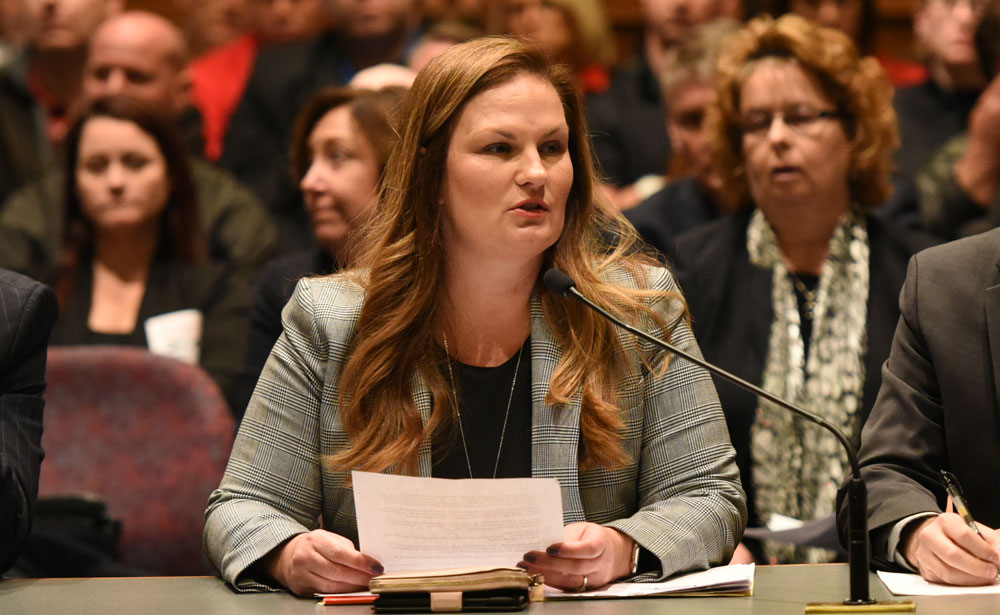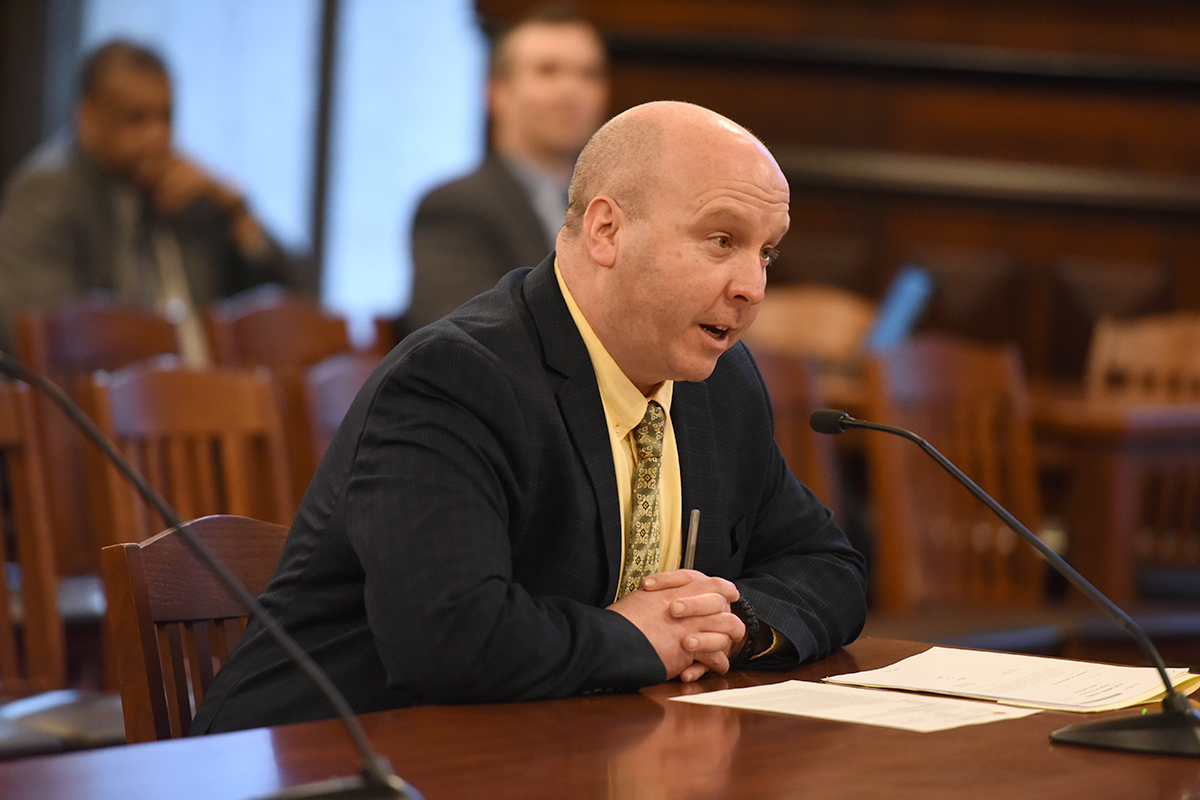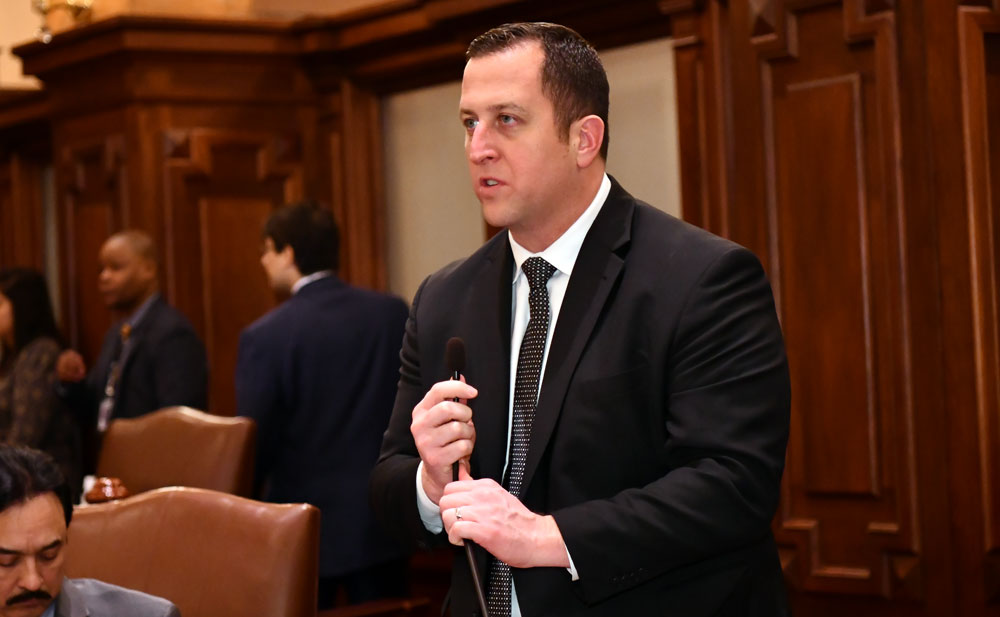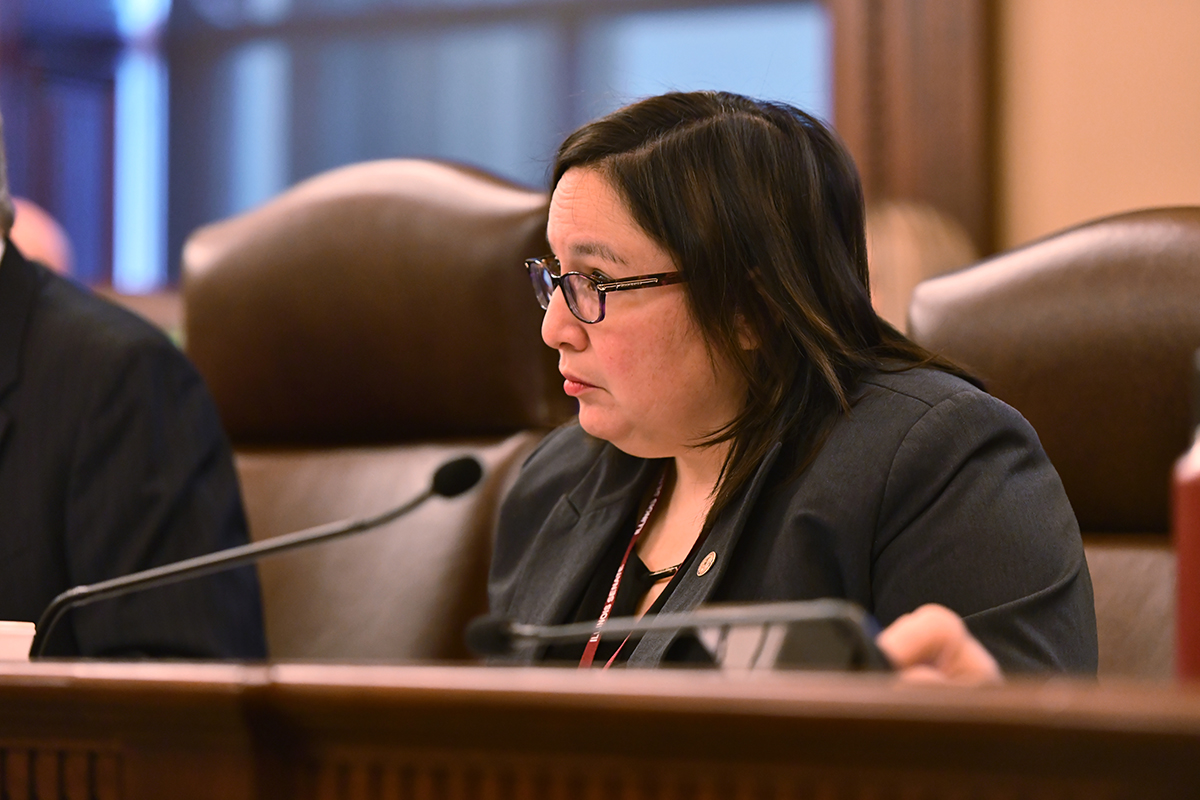- Details
- Category: Senator Rachelle Crowe News
 Illinois Department of Veterans’ Affairs promotes ‘Operation Rising Spirit’
Illinois Department of Veterans’ Affairs promotes ‘Operation Rising Spirit’
MARYVILLE – In response to visiting restrictions placed on Illinois veterans’ homes to curb the spread of COVID-19, the Illinois Department of Veterans’ Affairs launched a campaign to raise the spirits of military veterans and the staff who care for them, and State Senator Rachelle Crowe (D-Glen Carbon) is encouraging residents to participate.
“Although there is a lot going on in the world, we can’t forget to express support for our veterans,” Crowe said. “I challenge anyone with extra time, students wanting to express their creativity and our most patriotic residents to send uplifting messages of encouragement to our heroes.”
Families, friends, students, veteran service organizations, and other community members from across the state are encouraged to participate in Operation Rising Spirit. Cards, emails, signs and video messages can be sent directly to the homes at the addresses below:
Illinois Veterans' Home at Anna
792 N. Main St., Anna, IL 62906
C/O: Anthony Barnett
Illinois Veterans' Home at LaSalle
1015 O'Conor Ave., LaSalle, IL 61301
C/O: Susan Scully
Illinois Veterans' Home at Manteno
1 Veterans Dr., Manteno, IL 60950
C/O: Dave Pedersen
Illinois Veterans' Home at Quincy
1707 N. 12th St., Quincy, IL 62301
C/O: Sara Colgrove
Prince Home at Manteno
1 Veterans Dr., Manteno, IL 60950
C/O Wali Lewis
More information is available on the IDVA website.
- Details
- Category: Senator Tom Cullerton News
 Illinois Department of Veterans’ Affairs promotes ‘Operation Rising Spirit’
Illinois Department of Veterans’ Affairs promotes ‘Operation Rising Spirit’
VILLA PARK – During the COVID-19 pandemic, Illinois’ veterans are unable to meet with friends and family members since visiting restrictions are in place at state veterans’ homes to curb exposure to the virus.
To brighten the days of the state’s veterans population the Illinois Department of Veterans’ Affairs launched a campaign to raise the spirits of military veterans and the staff who care for them, and Tom Cullerton, the Chairperson of the Senate’s Veterans Affairs Committee, is urging residents to participate.
“Our veterans have put their lives on the line to keep us safe, and this is one small way for us to raise their spirits and show them we still appreciate the sacrifices they made to keep our great nation safe,” State Senator Tom Cullerton said. “I encourage DuPage County residents and our students looking for ways to help the community to take just a little time to send uplifting messages to our heroes.”
Families, friends, students, veteran service organizations, and other community members from across the state are encouraged to participate in Operation Rising Spirit. Cards, emails, signs and video messages can be sent directly to the homes at the addresses below:
Illinois Veterans' Home at Anna
792 N. Main St., Anna, IL 62906
C/O: Anthony Barnett
Illinois Veterans' Home at LaSalle
1015 O'Conor Ave., LaSalle, IL 61301
C/O: Susan Scully
Illinois Veterans' Home at Manteno
1 Veterans Dr., Manteno, IL 60950
C/O: Dave Pedersen
Illinois Veterans' Home at Quincy
1707 N. 12th St., Quincy, IL 62301
C/O: Sara Colgrove
Prince Home at Manteno
1 Veterans Dr., Manteno, IL 60950
C/O Wali Lewis
More information is available on the IDVA website.
- Details
- Category: Senator Jacqueline Y. Collins News
 CHICAGO – Following Gov. JB Pritzker’s announcement today that his administration will launch a $636 million Business Interruption Grants program, State Senator Jacqueline Collins (D-Chicago) urged local business owners to apply.
CHICAGO – Following Gov. JB Pritzker’s announcement today that his administration will launch a $636 million Business Interruption Grants program, State Senator Jacqueline Collins (D-Chicago) urged local business owners to apply.
“I applaud the governor’s action today, and am gratified to see that one large part of it will be aimed at businesses in disproportionately impacted areas with recent significant property damage,” Collins said. “This shows an understanding of what business owners in these areas are going through and what help they need to stay afloat in light of the once-in-a-lifetime hardship they now face.”
The Illinois Dept. of Commerce and Economic Opportunity will launch a first round of $60 million BIG grant funding for small businesses harmed by the pandemic, many of whom have also seen damage as a result of recent civil unrest. The funds are intended to help small businesses stay viable through the pandemic, help offset the costs of months of being shut down or restricted in their operations, and ensure they have the resources to reopen safely in the near future.
Among other specific programs, DCEO plans to disburse $20 million across 1,000 grants of $20,000 each to businesses in disproportionately impacted area with recent significant property damage. Those who qualify for these grants include:
- Businesses with under $2 million in revenue in 2019, or pro-rated amount if in business for less than a year. Such business must have in operation for at least three months prior to March 2020.
- Applicants who can attest to experiencing costs or losses of at least $20,000 since the Stay at Home order was put in place on March 21, 2020 due to closure or reduced operations as a result of the COVID pandemic.
- Businesses within a subset of DIAs that have experienced recent property damage, exacerbating the economic impacts of COVID.
DCEO and its grant administration partners are scheduled to post applications this week for review and questions, with applications being accepted June 24 through July 1. Applicants who are selected for the grants should hear from grant administration partners by early July, and grants are scheduled to be disbursed by the end of July.
- Details
- Category: Senator Michael E. Hastings News
 FRANKFORT – State Senator Michael E. Hastings is encouraging local business owners to take advantage of available grant money via the newly created Business Interruption Grant program.
FRANKFORT – State Senator Michael E. Hastings is encouraging local business owners to take advantage of available grant money via the newly created Business Interruption Grant program.
“While the governor is assessing what a full reopening of these facilities could look like, these grants will provide sorely needed financial assistance.” Hastings said. “Restaurants can provide curbside service and many other businesses can deliver or use teleconferencing methods, but gyms are among those businesses that have had to sacrifice for public safety. I appreciate their efforts to do so, and I encourage local business owners to apply for these grants as soon as they become active in the coming days.”
The Illinois Department of Commerce and Economic Opportunity will disperse $10 million dollars in relief funding for 500 fitness centers. Additionally, $20 million will allocated for bars and restaurants that have suffered losses due to COVID-19. In order to be eligible:
- All applicants must attest to experiencing costs or losses of at least $20,000 since the Stay at Home order was put in place on March 21, 2020 due to closure or reduced operations as a result of the COVID pandemic.
- A fitness facility must have made less than $2 million in revenue in 2019, or pro-rated revenue if in business for less than a year. Such businesses must have been operating for at least three months prior to March 2020.
- Businesses must occupy a gym facility. Health or fitness service providers that provide remote services or travel to different sites/client locations without a permanent establishment open to members are not eligible. Facilities must submit proof of client agreement or other evidence of operation as a fitness center.
- Eligible bars and restaurants will be those with under $3 million in revenue in 2019, or pro-rated amount if in business for less than a year. Business must have been an operating business for at least three months prior to March 2020.
- Grant award will be $20,000 for restaurants earning $2-3 million in revenue in 2019 and $15K for restaurants/bars earning less than $2 million.
- Only bars and restaurants that have not provided outdoor food and beverage service during Phase 3 will be eligible. This could be for any reason including prohibition by local ordinance, lack of access to outdoor space, or financial infeasibility.
Grants are given out on a first come, first serve basis, and will become available on Monday, June 22.
- Details
- Category: Senator Cristina Castro News
 ELGIN – On Tuesday, Gov. JB Pritzker signed a bill expanding the state’s vote-by-mail program. State Senator Cristina Castro (D-Elgin) supported the measure to help safeguard the health and safety of voters.
ELGIN – On Tuesday, Gov. JB Pritzker signed a bill expanding the state’s vote-by-mail program. State Senator Cristina Castro (D-Elgin) supported the measure to help safeguard the health and safety of voters.
“Even though we are in unprecedented times and a lot of us are taking things one day at a time, there are many aspects of our lives that will not wait for the coronavirus pandemic to end, and voting is one of them,” Castro said. “Election Day is coming, and people are going to want to vote, so we need to make sure that they can do so without risking their health or the health of their loved ones.”
The expansion of vote-by-mail came as part of a larger election package legislators passed during a special session earlier this spring to addressing COVID-19 concerns. The new law will require local election authorities to automatically send vote-by-mail applications to everyone who voted in the 2018 general, 2019 consolidated or 2020 primary elections, or who registered to vote after the 2020 primary.
The package also establishes Election Day as a state holiday in 2020, to allow schools to be used as polling locations and to help recruit more high school students as election judges, since many of those who frequently serve as election judges are senior citizens, and thus at higher risk in light of the COVID-19 pandemic..
“Voting is one of the most essential rights we have as citizens, and we should always be working to make it easier to vote, not harder,” Castro said.
The law is effectively immediately and applies only to the 2020 general election.
- Details
- Category: Senator Patricia Van Pelt News
 CHICAGO – State Senator Patricia Van Pelt (D-Chicago) joined Gov. Pritzker and members of the Black, Latino and Asian Caucuses to announce new grants that will help businesses that have faced extreme hardship due to COVID-19-related closures.
CHICAGO – State Senator Patricia Van Pelt (D-Chicago) joined Gov. Pritzker and members of the Black, Latino and Asian Caucuses to announce new grants that will help businesses that have faced extreme hardship due to COVID-19-related closures.
“Many business owners fear that they have suffered past the point of recovery because they have done the right thing and closed to prevent the spread of COVID-19,” Van Pelt said. “But I am hopeful that these grants will help alleviate that damage and ensure these local businesses can look forward to a day when this crisis is behind us.”
The Illinois Department of Commerce and Economic Opportunity is directing the Business Interruption Grants (BIG) program, which allocates $636 million toward new grant initiatives. The first round of BIG grants is valued at $60 million and aims to offset the costs that businesses acquired during the COVID-19 pandemic as well as recent civil unrest. Grants are broken down by type of business as follows:
- Businesses in Disproportionately Impacted Areas (DIAs) with Recent Significant Property Damage
- 1,000 grants of $20,000.
- Bars and Restaurants
- 1,000 grants of $20,000.
- 50% of grants will go to businesses in DIAs.
- Barbershops and Salons
- 1,000 grants of $10,000.
- 50% of grants will go to businesses in DIAs.
- Fitness Centers
- 500 grants of $20,000.
- 30% of grants will go to businesses in DIAs.
Applications for these programs will open Monday, June 22 on the Illinois Department of Commerce and Economic Opportunity (DCEO) website and will remain open for 7-14 days. One week after the application period closes, grant administration partners will begin reaching out to recipients.
- Details
- Category: Senator Andy Manar News
 DECATUR – To support Decatur’s frontline health workers leading the fight against COVID-19, State Senator Andy Manar (D-Bunker Hill) partnered with John Deere, the United Auto Workers, and the Illinois Manufacturers Association today to deliver 350 face shields to Crossing Healthcare.
DECATUR – To support Decatur’s frontline health workers leading the fight against COVID-19, State Senator Andy Manar (D-Bunker Hill) partnered with John Deere, the United Auto Workers, and the Illinois Manufacturers Association today to deliver 350 face shields to Crossing Healthcare.
“Crossing Healthcare is extremely grateful to Senator Manar and the team at John Deere for their generous donation of 350 face shields to our clinic. These face shields will allow our medical providers to continue to provide COVID testing and ongoing care to the community,” said Crossing Healthcare CEO Tanya Andricks. “Supporting community health centers in this way means supporting our mission and values. At a time when health disparities are being exposed, Crossing Healthcare will continue to work diligently to fill those gaps for everyone. We are glad to be joined in these efforts by Senator Manar and John Deere.”
Crossing Healthcare is a Federally Qualified Health Center that provides primary outpatient medical care to Macon and surrounding Counties. It is one of two COVID-19 testing sites serving the Decatur Community, according to the Illinois Department of Public Health website.
“Crossing Healthcare is integral to Decatur’s COVID-19 response. We wanted to find a way to support the efforts of Tanya Andricks and the Crossing staff as they continue provide high quality primary care and health services, while also serving as a leading testing hub in this community,” Manar said. “Thank you to John Deere, the United Auto Workers, and the Illinois Manufacturers Association for their partnership.”
Personal protective equipment prices are volatile due to the current shortage, and some providers have struggled to acquire adequate supplies.
Face shields are a type of personal protective equipment used by medical personnel that protect the wearer's entire face from hazards such as flying objects, chemical splashes, or potentially infectious materials.
- Details
- Category: Member News
 CHICAGO – Majority Leader Kimberly Lightford (D-Maywood) and State Senator Patricia Van Pelt (D-Chicago) joined Gov. Pritzker and small business owners to announce new grants that will help businesses that have been particularly harmed by closures to recover from the COVID-19 pandemic.
CHICAGO – Majority Leader Kimberly Lightford (D-Maywood) and State Senator Patricia Van Pelt (D-Chicago) joined Gov. Pritzker and small business owners to announce new grants that will help businesses that have been particularly harmed by closures to recover from the COVID-19 pandemic.
“Black and Latino communities are the hardest hit by COVID-19, another symptom of the disease that is racism in our country,” Leader Lightford said. “Working families who have yet to receive a proper pay day have struggled to maintain during this time. Our small business built in our local communities by the people who care about them the most were forced to shut down and were damaged by individuals who exploited our pain for personal gain. They need a government that will work for them without hesitation.”
The Business Interruption Grants (BIG) program is a $636 million initiative administered by the Illinois Department of Commerce and Economic Opportunity (DCEO). The first round of BIG grants, valued at $60 million, will offset the costs that businesses incurred during the COVID-19 pandemic and recent civil unrest. Grants are broken down by type of business as follows:
- Businesses in Disproportionately Impacted Areas (DIAs) with Recent Significant Property Damage
- 1,000 grants of $20,000.
- Bars and Restaurants
- 1,000 grants of $20,000.
- 50% of grants will go to businesses in DIAs.
- Barbershops and Salons
- 1,000 grants of $10,000.
- 50% of grants will go to businesses in DIAs.
- Fitness Centers
- 500 grants of $20,000.
- 30% of grants will go to businesses in DIAs.
DCEO will publish a full list of eligible costs and losses that can be covered by the BIG program. Applications for these programs will open Monday, June 22 on the Illinois Department of Commerce and Economic Opportunity (DCEO) website and will remain open for 7-14 days. One week after the application period closes, grant administration partners will begin reaching out to recipients. Priority will be given to businesses in DIAs.
More Articles …
Page 676 of 769













 © 2026 Illinois Senate Democratic Caucus
© 2026 Illinois Senate Democratic Caucus